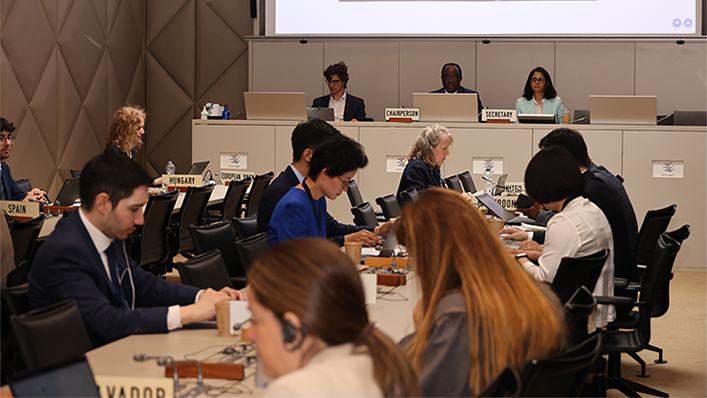
The Committee considered the Comprehensive Economic Partnership Agreement between India and the United Arab Emirates (UAE), services. The Agreement came into force on 1 May 2022. It covers goods, trade in services, movement of natural persons, investment, intellectual property rights, digital trade, and small and medium enterprises (SMEs). Regarding trade in services, India and the UAE provide sectoral commitments that enhance their commitments under the WTO General Agreement on Trade in Services (GATS). The liberalization of trade in goods, moreover, will be completed by 2031, by which time customs duties will have been eliminated by India on 84.7% of its tariff lines and by the UAE on 97.1% of its tariff lines.
India said at the meeting that the Agreement is a growth engine for India-UAE bilateral trade. The Agreement broadens and deepens services liberalization, India said, noting that it has offered commitments for 100 sub-sectors in services to the UAE and that UAE made offers concerning 111 sub sectors to India.
The Committee also considered the Comprehensive Economic Partnership Agreement between Indonesia and the Republic of Korea, goods and services, which entered into force on 1 January 2023. The parties will liberalize more than 92% of their import tariffs by the end of its implementation in 2042. The Agreement also builds on the parties’ GATS commitments to grant better preferential treatment for their respective services and investments. The Agreement further reaffirms the parties’ existing rights and obligations under a number of WTO agreements covering technical barriers to trade, sanitary and phytosanitary measures, anti-dumping measures, subsidies and countervailing measures, and trade-related aspects of intellectual property rights.
The Republic of Korea said the Agreement will enhance the existing commitments with the Association of Southeast Asian Nations (ASEAN). Indonesia said the Agreement also provides a comprehensive framework to further improve trade in services as Indonesia has opened over 100 sub sectors to 100% foreign equity participation. Both countries have committed to facilitate the movement of inter-corporate transferees, business visitors and independent professionals.
The Free Trade Agreement between the Republic of Korea and Cambodia, goods, entered into force on 1 December 2022. The Republic of Korea will liberalize almost 95% of its tariffs and Cambodia will liberalize almost 90% of its tariffs by 2041. Tariffs will remain mainly for agricultural products. The Agreement also includes regulatory provisions on technical barriers to trade, sanitary and phytosanitary measures, safeguards, trade defence measures, and dispute settlement. The parties will also engage in economic and technical cooperation in several areas.
The Republic of Korea said the bilateral agreement will expand on its commitments with ASEAN countries; moreover, it will discuss with Cambodia about initiating negotiations on trade in services and investment in due course. Cambodia said it has noted progress one year after the Agreement entered into force as bilateral trade has hit new levels, reaching US$ 1.05 billion by December 2023. Cambodia said it was optimistic that the Agreement will become an important mechanism to promote more trade and investment cooperation between both countries.
The Free Trade Agreement between the United Kingdom, Iceland, Liechtenstein and Norway, goods and services, provides continuity of preferential treatment among the parties in line with when the UK was a member of the European Union. Under the Agreement, the UK liberalized almost 91% of its tariffs on imports from Iceland by 2021 and will liberalize almost 83% of its tariffs for imports from Norway by 2025. Iceland liberalized all but 3.2% of its tariffs for imports from the UK in 2022, and Norway liberalized all but 9% of its tariffs by 2021. All three parties maintain tariff rate quotas. In trade in services, the provisions go beyond the parties’ GATS commitments. There are also provisions on labour and environment, electronic commerce, SMEs, women’s economic empowerment, good regulatory practices and regulatory cooperation.
The UK, speaking on behalf of all the parties to the Agreement, said the Agreement reaffirms the value of their long-standing relationship and provides predictability, protection and opportunities for businesses, investors and consumers in their countries. It noted improvements in commitments concerning rules of origin, technical barriers to trade, and sanitary and phytosanitary measures. The Agreement also includes provisions to secure continued market access in a broad range of services sectors. The UK said the parties will continue to work closely together on effective implementation of commitments and reducing trade barriers to ensure that businesses and consumers fully benefit from the comprehensive agreement.
The Committee also took note of seven notifications of regional trade agreements.
The chair noted that there are 30 RTAs involving WTO members and 38 involving non-members for which a factual presentation has to be prepared, counting goods and services separately. He also noted that the WTO Secretariat had circulated a list of 55 RTAs currently in force that had not been notified to the WTO.
Next meeting
The next Committee meeting is scheduled for 18-19 November.
Share
Reach us to explore global export and import deals